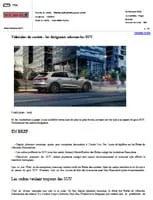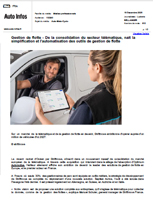
Web Media family: Mainstream specialty media
Audience: 1,432,741
Media subject: Auto-Moto-Cyclo
Date: October 22, 2024
Journalists: Hugo Quintal
Number of words: 540
Country: FRA
Source: www.autojournal.fr
Company cars: Executives love SUVs
Photo Credit: Audi
While the incentives to switch to green mobility are becoming stronger, some are finding it difficult to do without large SUVs. Especially executive managers.
IN SHORT
- For several weeks, four European countries have been asking Ursula Von Der Leyen to legislate on corporate vehicle fleets.
- Executives prefer SUVs for their status, holding back the electrification of fleets despite financial incentives.
- Find out why SUVs remain popular despite their environmental impact and how this affects the ecological transition.
Whether it's the state or businesses, many want to green corporate fleets. But executives seem to be having a hard time without big SUVs. However, it is a good way to make both financial and environmental savings.
Executives still want SUVs
It is at the European level that this will be played out. In fact, for several weeks, the debate over corporate vehicle fleets has been relaunched. There are even 4 countries (Austria, Netherlands, Ireland, Belgium) that want the president of the European Commission, Ursula Von Der Leyen, to legislate on company vehicles. This is to encourage these companies to opt for greener vehicles.
In France, there is even talk of putting some financial incentives back in place. But a problem persists, SUVs are still very (too much?) present. But there is also a problem of supply and demand. Especially if companies are soon forced to green their fleets.
In fact, brands have often started their electrification with high-end models. Thus, they are expensive models, reserved for senior managers in most companies. This does not make it possible to increase the electrification rate. In any case, it does not speed it up.
Executives want to maintain a statutory model with a high level of services and benefits. SUVs are therefore preferred.

Electrification slowed
Our colleagues from The Echoes Report a behavior of PageGroup:
“Electric vehicles are equivalent in terms of range to those offered so far, whether thermal or hybrid. We did not want employees to feel like they were regressing”, justifies the company in the columns of daily economic newspapers.
Daniel Vassallucci, CEO of the Optimum Automotive fleet management platform, says that the image of the most prestigious vehicles is still very important. This is evidenced by the preferred choice of Audi, BMW, Porsche or Mercedes models, even electric ones.
This is precisely the problem since this type of body is necessarily more energy-intensive. Even for equivalent segment and power, an SUV is more fuel-efficient over its entire life cycle than a city car or a hatchback.
Their manufacturer consumes up to 5 times more rare metals such as copper, lithium, nickel or cobalt than electric city cars.
However, the crossover or SUV is very often the best seller of all brands, premium or general.
Mercedes GLE 350 from: what is the real 100% electric autonomy?
The Mercedes GLE 350 really offers more than 100 km of 100% electric autonomy.
Slideshow: 6 photos; https://www.autojournal.fr/environnement/vehicules-societe-dirigeants-adorent-suv-367889.html
#gestion_de_flotte, #IA, #plateforme, #mobilité, #économie








